Józef Święcicki
Józef Święcicki (9 March 1859 – 3 November 1913) was a fecund designer and builder of Bydgoszcz, under Prussian rule. A vast majority of his eclectic-style works can still be found all around the city. Józef Swiecicki was part of architects and builders who gave a characteristic shape to the city at the turn of the 19th and 20th centuries, dominated by eclectic buildings with various styles, including Art Nouveau or Modernism.[1]
Józef Święcicki | |
|---|---|
 Purported face of Józef Świecicki as carved on Hotel "Pod Orlem" facade in Bydgoszcz | |
| Born | 9 March 1859 |
| Died | 3 November 1913 (aged 54) |
| Nationality | Prussian |
| Occupation | architect |
| Spouse(s) | Maria Henrietta Ehrlich (1865 – c. 1942) |
| Signature | |
 | |
Life
Józef Stanisław Święcicki was born on 9 March 1859 in Bromberg.[2] He was the son of Franciszek (1810–1863), a shoemaker and Michalina (1827–1912). He had four brothers and three sisters, all born and baptized in Bydgoszcz. His mother left Franciszek, his father, who had turned alcoholic and died at 54[3] from delirium (7 December 1863). Michalina took for second husband Anton Hoffmann (1823–c.1904), a city master bricklayer, who taught young Józef construction rudiments.
Around 1881, he graduated from secondary construction school and passed the state examination to become a builder (German: Baugewerksmeister). He performed professional training with Anton Hoffmann. He started to co-run with his stepfather a large design and construction business, Święcicki-Hoffmann studio, during a couple of years (from the mid-1880s to 1887), before taking the lead of his own firm until 1903. This decision to preside over his personal company is linked to his marriage in 1888, and his subsequent leaving the family home, a rented flat at Gamm straße 26,[4] today's Warmińskiego street 8, near Focha street.
His most productive period as a designer in Bromberg was in the 1890s. He designed over 60 tenement houses in downtown district[5] among which 21 projects on Gdańska Street, the main city thoroughfare. He also designed a number of other buildings in various places around the city, as well as outside Bydgoszcz.[6] He set up in 1892 a stucco ornament factory (German: Fabrik von Stuckornamenten track Facaden- und Innendekoration),[4] which products decorated the façades of its tenement houses. Located at Kościuszki street 12, it soon became a profitable workshop. Even after its selling in the 1890s, the company, rebranded several times, operated until October 1912.[4]
In 1898, he was commissioned by Józef Choraszewski, a Bromberg parish priest to work on the project of the Church of the Holy Trinity, but it was eventually realized by another architect, Roger Sławski. He left many admired works that stand out today in the architecture of Bydgoszcz. In particular, three projects are seen as icons of Neo-Baroque architecture:
- His own tenement house at Gdańska Street 63, where he lived from 1896 to 1905;
- Hotel "Pod Orlem", also in Gdańska Street;
- Tenement at Freedom Square 1.
A major part of his works was the construction of tenement houses according to his own designs on plots he had purchased, which were then sold with a profitable margin. In 1893 he became a board member of Bydgoski Bank Przemysłowy (Industrial Bank of Bydgoszcz), and then deputy chairman of the bank's supervisory board in 1909.
In October 1894, Święcicki purchased the property at Gdańska Street 63, as well as probably few plots along Cieszkowskiego Street, to erect his own tenement. In September 1896, he moved to his new home with his family. He added a wing on Cieszkowskiego Street in 1899, to house his business headquarters where he worked till his death.[4]
In 1905, the family settled in a newly erected house at Adam Mickiewicz Alley 17: in the recess of the estate he built a garage, where he stored his own car, one of the few private vehicles in Bromberg at the time. He funded several educational institutions in the city in the 1910s[7] to help out poor but talented students of Bydgoszcz.
In the autumn of 1913, he went on a journey by train to rest in the Western German Empire. On the way back, he fell down while climbing in Berlin underground train, and suffered concussion. This injury caused his death, on 2 November 1913, at Berlin's St Hedwig hospital. His body was transported back to Bydgoszcz and buried in the Nowofarny cemetery in Bydgoszcz.
Personal life
Józef Święcicki from 1888 was married to Maria Henrietta Ehrlich (born in 1865 in Chełmno). On 30 April 1895, they adopted Hugo Rudolf Fiedler, an abandoned boy from an orphanage, born 1892 in Berlin.
His favorite pastime was chess, which he played during most of his free time. Logically, he co-founded the Bydgoszcz Chess Society in 1886, to which he belonged as an honorary member till 1910.[4]
In addition to this successful real estate trade, he is the author of two pieces premiered in Bydgoszcz municipal theater (1901). He also published in 1910 an Illustrated Guide in Bydgoszcz (Polish: Ilustrowany Przewodnik w Bydgoszczy), in which he presented all major buildings in a shortened, popular form, complemented with address lists of facilities (hotels, restaurants ...). He also co-wrote a book about building conservation (Berlin, 1910).[4]
His son Hugo Święcicki graduated from the Agricultural University in Bonn and lived in western Germany. His wife Maria, however, had been living in Bydgoszcz until his death (c. 1942), and preserved the memory of Józef Święcicki, through testimonies and scholarship donations.
Style
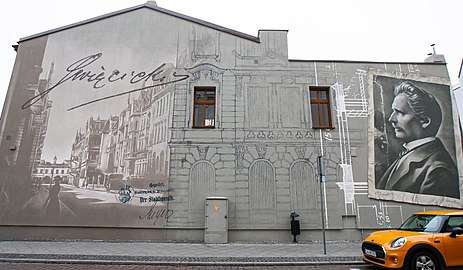
Święcicki was rather a conservative creator. Most of his projects have dominantly an eclectic style, mostly prominent in its tenement houses, where one can perceive patterned detail arrangements with a forms of Historicism.
He boldly exploited elements of Renaissance, Mannerism and Baroque architecture. Święcicki's style is characterized by a passion for symmetry, rhythmical vertical divisions, accentuated by the arrangement of windows, pilasters and a multitude of stucco ornaments.[8]
In November 2018, the city of Bydgoszcz honored the memory of the architect by dedicating a mural to Święcicki and his works, on a wall located at the corner of Gdańska and Cieszkowskiego Streets, in front of his former house[9]
Works in Bydgoszcz
| Year | Edifice | Remarks | Picture |
| 1882 | Tenement house | Located at 46 Śniadecki Street. Earliest surviving project realized in cooperation with his stepfather Anton Hoffmann. | 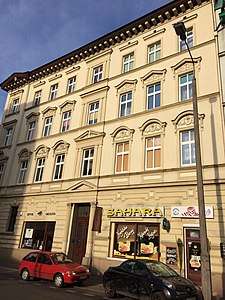 |
| 1882 | Max Schmidt tenement | Located at 42 Śniadecki Street |  |
| 1883 | Wing addition | Tenement located at 15 Podwale Street | 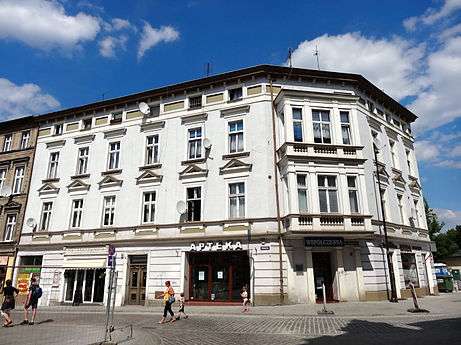 |
| 1885 | Tenement house | Located at 100 Dworcowa Street in Bydgoszcz | 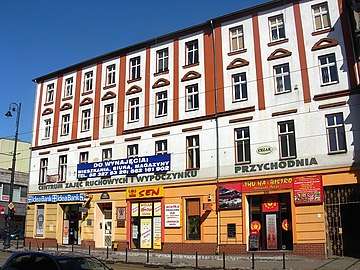 |
| 1885 | Reinhold Zschiesche Tenement | Located at 1 Chocimska Street, corner with Gdańska Street |  |
| 1886 | Rudolf Gehrke tenement | Located at 113 Gdańska Street | |
| 1886 | Tenement house | Located at 115 Gdańska Street | 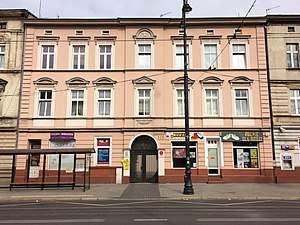 |
| 1886 | Tenement house | Located at 137 Gdańska Street |  |
| 1886 | Hugo Bille Villa | Located at 3 Piotra Skargi Street. Registered on Kuyavian-Pomeranian Voivodeship heritage list[10] |  |
| 1887 | Tenement house | Located at 86 Gdańska Street | 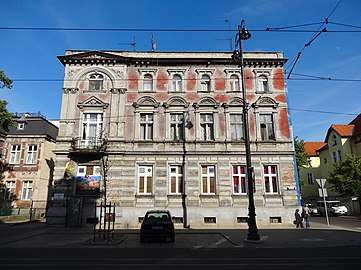 |
| 1887 | Tenement house | Located at 4 Dworcowa Street | 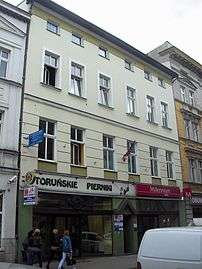 |
| 1888 | Villa Hugo Hecht | Located at 88/30 Gdańska Street | 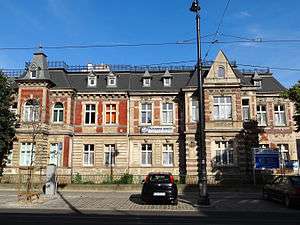 |
| 1889 | Tenement house | Located at 64 Gdańska Street. The first house built under his own name. | 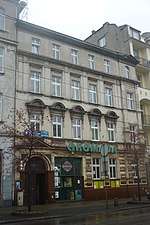 |
| 1889 | Hugo Hecht tenement house | Located at 92/94 Gdańska Street. Registered on Kuyavian-Pomeranian Voivodeship heritage list[11] | 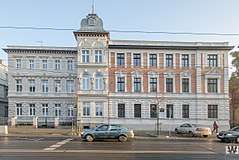 |
| 1889 | Adolf Hoffmann tenement house | Located at 7 Wool Market square | 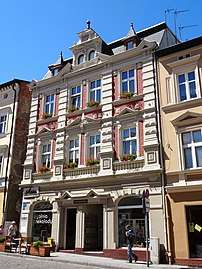 |
| 1889 | William Wick Tenement | Located at 30 Śniadeckich Street | 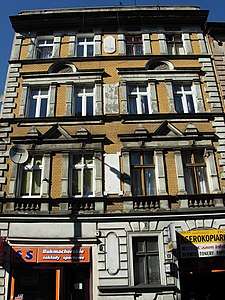 |
| 1890 | Aleksander Theil Tenement | Located at 39 Dworcowa Street | 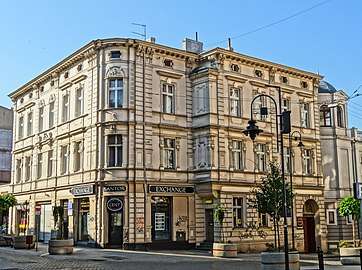 |
| 1891 | Stanisław Rolbieski tenement | Located at 96Gdańska Street | 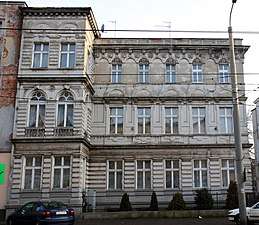 |
| 1891 | Ludwig Schultz Tenement | Located at 54 Dworcowa Street | 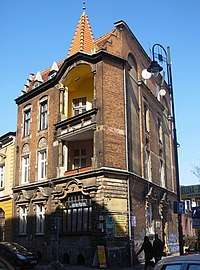 |
| 1892 | Carl Peschel tenement | Located at 101 Gdańska Street. Registered on Kuyavian-Pomeranian Voivodeship heritage list[12] | 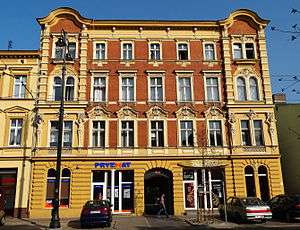 |
| 1893 | Tenement houses | Located at 1/3 Stary Port Street. Registered on Kuyavian-Pomeranian Voivodeship heritage list[13] |
| Year | Edifice | Remarks | Picture |
| 1893 | Robert Aron Tenement | Located at 36 Jagiellońska street | |
| 1893 | Albert Voigt tenement | Located at 38 Śniadeckich Street | 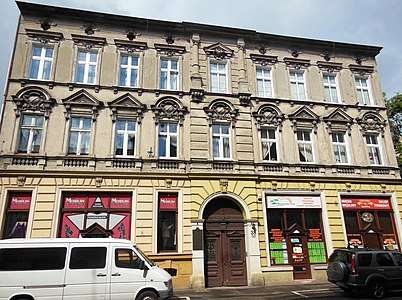 |
| 1893 | Hotel "Pod Orlem" | Located at 14 Gdańska Street. Registered on Kuyavian-Pomeranian Voivodeship heritage list[14] | 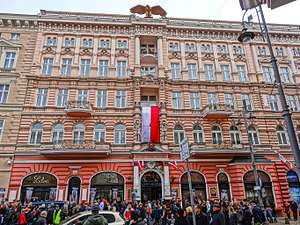 |
| 1894 | Pharmacy Pod Lwem (Under the lion) | Located at 37 Grunwaldzka street in Bydgoszcz | 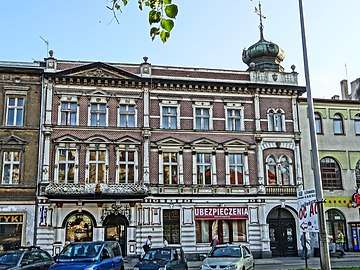 |
| 1895 | Oskar Ewald Tenement | Located at 30 Gdańska Street | 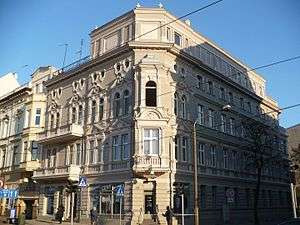 |
| 1895 | Franz Bauer Tenement | Located at 30 Jagiellońska street | |
| 1895 | Józef Święcicki tenement | Located at 63 Gdańska Street. Registered on Kuyavian-Pomeranian Voivodeship heritage list[15] | 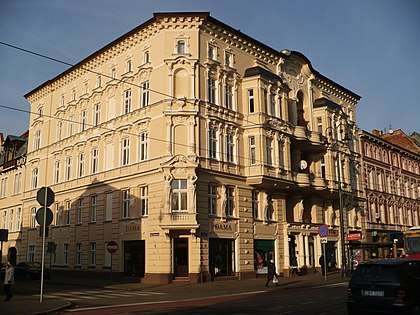 |
| 1895 | Carl Bradtke Tenement | Located at 93 Gdańska Street. Registered on Kuyavian-Pomeranian Voivodeship heritage list[16] | 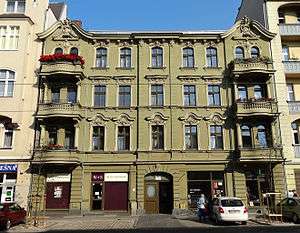 |
| 1896 | Tenement house | Located at 48 Pomorska Street. Registered on Kuyavian-Pomeranian Voivodeship heritage list[17] | |
| 1896 | Wilhelm Kopp's Tenement | Located at 2 Wool Market square | 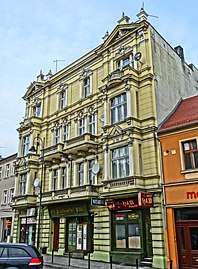 |
| 1896 | Albert Voigt Tenement | Located at 5 Pomorska Street. Registered on Kuyavian-Pomeranian Voivodeship heritage list[18] | |
| 1896 | Tenement at 1 Freedom Square | Registered on Kuyavian-Pomeranian Voivodeship heritage list[19] | 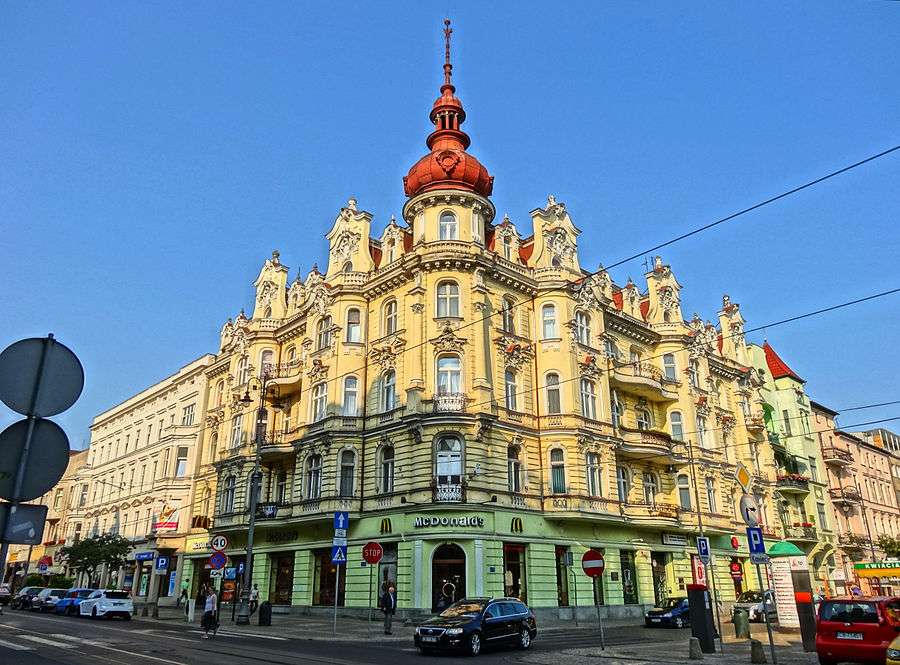 |
| 1896 | Tenement house | Located at 69 Gdańska Street | |
| 1897 | Tenement house | Located at 5 Kołłątaja street | 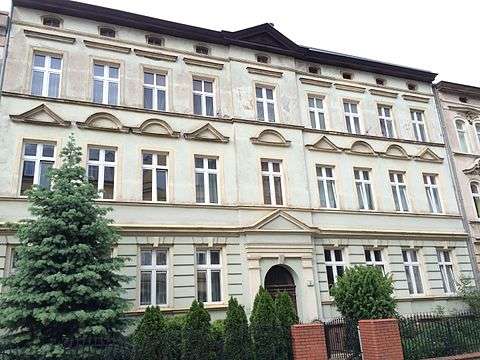 |
| 1897 | Theonia Reichhardt House | Located at 36 Gdańska Street | |
| 1897 | Gustav Reschke's house | Located at 17 Cieszkowskiego Street | 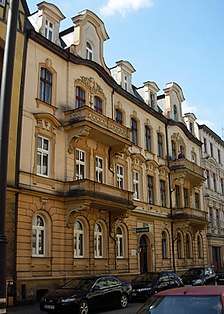 |
| 1898 | Gustav Reschke's house | Located at 11 Cieszkowskiego Street. Registered on Kuyavian-Pomeranian Voivodeship heritage list[20] | 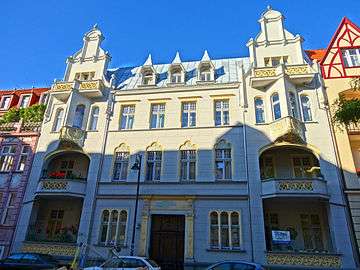 |
| 1899 | Tenement house | Located at 4 Cieszkowskiego Street. Project by Józef Święcicki, realized by Rudolf Kern. | .jpg) |
| 1899 | Tenement house | Located at 8 Cieszkowskiego Street | 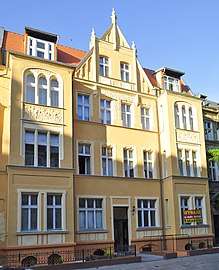 |
| 1905 | Józef Święcicki Villa | Located at 17 Adam Mickiewicz Alley | 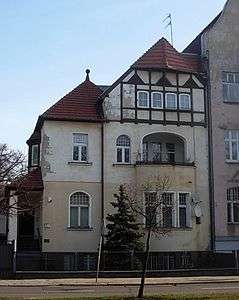 |
| 1911 | Tadeusz Browicz Hospital for Infectious Diseases in Bydgoszcz | Located at 10/18 Świętego Floriana Street, along the Brda river |
See also
| Wikimedia Commons has media related to Józef Święcicki. |
References
- Zielazna, Jolanta (29 December 2016). "Józef Święcicki i Bydgoszcz, w której zostawił ślad". plus.pomorska.pl. pomorska.pl. Retrieved 15 April 2018.
- Bręczewska-Kulesza Daria, Derkowska-Kostkowska Bogna, Wysocka A (2003). Ulica Gdańska. Przewodnik historyczny. Bydgoszcz: Wojewódzki Ośrodek Kultury w Bydgoszczy. ISBN 9788386970100.
- Lewińska, Aleksandra (13 January 2017). ""Żyd i przechrzta". Zbudował najpiękniejszą część Bydgoszczy". bydgoszcz.wyborcza.pl. bydgoszcz.wyborcza. Retrieved 15 April 2018.
- DERKOWSKA-KOSTKOWSKA, BOGNA (2001). Józef Święcicki - szkic do biografii bydgoskiego budowniczego. MATERIAŁY DO DZIEJOW KULTURY I SZTUKI BYDGOSZCZY I REGIONU 6. Bydgoszcz: Pracownia dokumentacji i popularyzacji zabytków wojewódzkiego ośrodka kultury w Bydgoszczy. pp. 32–50.
- Lewińska, Aleksandra (2 October 2013). "100 lat temu skończył budować Bydgoszcz. Kim był?". bydgoszcz.wyborcza.pl. bydgoszcz.wyborcza. Retrieved 15 April 2018.
- jpl (12 January 2017). "Jest książka o budowniczym Bydgoszczy". expressbydgoski.pl. expressbydgoski. Retrieved 15 April 2018.
- a memorandum drafted on 10 June 1911, reports he handed over 5000 DM to the Bydgoszcz authorities
- Tarnowska, Anna; Lewińska, Aleksandra (9 March 2013). "Bez niego trudno sobie wyobrazić Bydgoszcz". bydgoszcz.wyborcza.pl. bydgoszcz.wyborcza. Retrieved 15 April 2018.
- Grażyna, Marks (2 October 2018). "Mural w salonie Bydgoszczy. Oryginalny. I już go nawet trochę widać". bydgoszcz.wyborcza.pl. bydgoszcz.wyborcza. Retrieved 11 January 2019.
- Reg.A/263/1, 28 May 1991 - zabytek-kujawsko-pomorskie-28.02.2014
- N°A/269/1, 21 August 1991 - zabytek-kujawsko-pomorskie-28.02.2014
- N°A/11, 12 October 1999 - zabytek-kujawsko-pomorskie-28.02.2014
- N°601409-Reg.A/1141, 6 May 1992 - zabytek-kujawsko-pomorskie-28.02.2014
- N°601295-reg.90/A, 15 December 1974 - zabytek-kujawsko-pomorskie-28.02.2014
- N°601309-Reg.A/1046, 25 May 1991 - zabytek-kujawsko-pomorskie-28.02.2014
- N°A/1126/1-4, 5 June 1993 - zabytek-kujawsko-pomorskie-28.02.2014
- N°601398-Reg.A/1099, 4 May 1994 - zabytek-kujawsko-pomorskie-28.02.2014
- N°601394, Reg.A/996, 4 February 1992 - zabytek-kujawsko-pomorskie-28.02.2014
- N°601429-Reg.A/1041, 20 October 1990 - zabytek-kujawsko-pomorskie-28.02.2014
- N°601272-Reg.A/1108, 16 November 1993 - zabytek-kujawsko-pomorskie-28.02.2014
Bibliography
- DERKOWSKA-KOSTKOWSKA, BOGNA (2001). Józef Święcicki - szkic do biografii bydgoskiego budowniczego. MATERIAŁY DO DZIEJOW KULTURY I SZTUKI BYDGOSZCZY I REGIONU 6 (in Polish). Bydgoszcz: Pracownia dokumentacji i popularyzacji zabytków wojewódzkiego ośrodka kultury w Bydgoszczy. pp. 32–50.
- Stanisław Błażejewski, Janusz Kutta, Marek Romaniuk (2000). Bydgoski słownik biograficzny: praca zbiorowa. T.6 (in Polish). Bydgoszcz: Kujawsko-Pomorskie Tow. Kulturalne. pp. 109, 110. ISBN 8385327584.CS1 maint: multiple names: authors list (link)